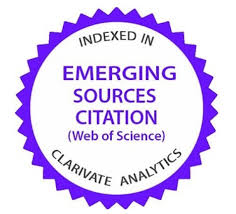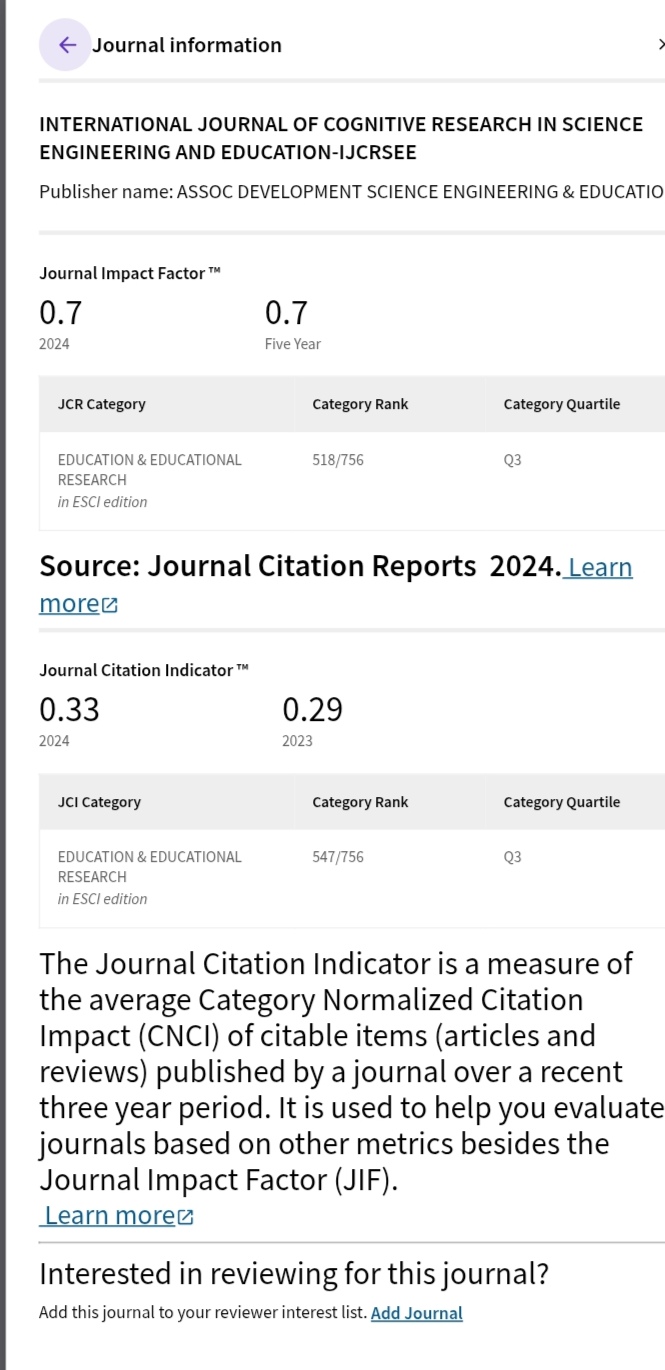The Impact of Performance on Students’ Reflective and Coping Strategies in Higher Education
DOI:
https://doi.org/10.23947/2334-8496-2025-13-2-491-503Keywords:
performance in higher education, performativity, reflective strategies, coping strategies, resilience, studentsAbstract
This research aimed to track the impact of performance as a pedagogical technique on students’ reflective and coping strategies. The study was conducted at the National University of Ostroh Academy (Ukraine) in the first autumn semester of 2024 (from September to December) on a sample of 120 students from such study programs as Psychology and Public Health. The type of design was a pretest-posttest experimental design (PPED), where we measured indicators both before (pretest) and after (posttest) the performance intervention. The methodological framework consisted of three approaches: the Reflective Problem-Solving Strategies (RPSS) (Savchenko and Makienko), the Coping Inventory for Stressful Situations (CISS) (Endler and Parker), and the BASIC Ph model (Lahad and Leykin). The study presented descriptive statistics, a chi-square test (x2), and Pearson’s correlation analysis to show connections between reflective and coping strategies. The study stated that performance positively changes reflective strategies, transforming and adapting them to external conditions. In particular, the results showed that students most frequently employed reflective strategies such as “Criticality in Analyzing and Evaluating Information” and “Making Decisions Based on Internal Standards” to achieve a more effective and systematic analysis of problems that arise during problem-solving. The Pearson correlation analysis revealed that reflective strategies correlate most strongly with active and adaptive coping strategies, such as the Social Distraction Scale (CSSS) and Social Support (BASIC Ph), indicating the importance of social (group) interaction in the development of cognitive skills. Altogether, the avoidance coping strategies have been decreased significantly, indicating an increase in problem-solving, decision-making, and responsibility. The conclusion is that performance increases reflective strategies by directly solving problems, using external resources as emotional support and social coordination within the group. Performance can create open conditions for reflective problem-solving and deep emotional support between participants, which will further increase student achievement and learning motivation.
Downloads
References
Achdiyah, H. N., Latipun, L., & Yuniardi, M. S. (2023). The influence of social support on academic performance: The mediating role of cognitive engagement. Jurnal Ilmiah Psikologi Terapan, 11(2), 85–90. https://doi.org/10.22219/jipt.v11i2.22651 DOI: https://doi.org/10.22219/jipt.v11i2.22651
Anderson, J. R. (2013). The architecture of cognition. Psychology Press. DOI: https://doi.org/10.4324/9781315799438
Arjomandi, A., Paloyo, A., & Suardi, S. (2023). Active learning and academic performance: The case of real-time interactive student polling. Statistics Education Research Journal, 22(1), 1–15. https://doi.org/10.52041/serj.v22i1.122 DOI: https://doi.org/10.52041/serj.v22i1.122
Asikainen, H., & Gijbels, D. (2017). Do students develop towards more deep approaches to learning during studies? A systematic review on the development of students’ deep and surface approaches to learning in higher education. Educational Psychology Review, 29(2), 205–34. http://www.jstor.org/stable/44956375. DOI: https://doi.org/10.1007/s10648-017-9406-6
Asikainen, H., Salmela-Aro, K., Parpala, A., & Katajavuori, N. (2020). Learning profiles and their relation to study-related burnout and academic achievement among university students. Learning and Individual Differences, 78. https://doi.org/10.1016/j.lindif.2019.101781 DOI: https://doi.org/10.1016/j.lindif.2019.101781
Baars, S., Schellings, G. L. M., Krishnamurthy, S., Joore, J. P., den Brok, P. J., & van Wesemael, P. J. V. (2020). A framework for exploration of relationship between the psychosocial and physical learning environment. Learning Environments Research, 24, 43–69. https://doi.org/10.1007/s10984-020-09317-y DOI: https://doi.org/10.1007/s10984-020-09317-y
Balashov, E. (2022). Psychological well-being as cognitive-emotional component of student self-regulated learning. International Journal of Cognitive Research in Science, Engineering and Education (IJCRSEE), 10(2), 101–109. https://doi.org/10.23947/2334-8496-2022-10-2-101-109 DOI: https://doi.org/10.23947/2334-8496-2022-10-2-101-109
Bokolo, A. Jnr. (2024). Examining blended learning adoption towards improving learning performance in institutions of higher education. Technology, Knowledge and Learning, 29, 1401–1435. https://doi.org/10.1007/s10758-023-09712-3 DOI: https://doi.org/10.1007/s10758-023-09712-3
Bucklin, B. A., Asdigian, N. L., Hawkins, J. L., & Klein, U. (2021). Making it stick: Use of active learning strategies in continuing medical education. BMC Medical Education, 21. https://doi.org/10.1186/s12909-020-02447-0 DOI: https://doi.org/10.1186/s12909-020-02447-0
Carlomagno, N. (2021). Performative didactics: The declination of simplexity in the performing arts. Nuova secondaria, 10, 419–428.
Caron, E. E., Hicks, L. J., Browne, D. T., Smilek, D., & Forrin, N. D. (2021). Performance anticipation diminishes memory: Evidence from a simulated classroom. Journal of Applied Research in Memory and Cognition, 10(3), 479–489. https://doi.org/10.1016/j.jarmac.2021.01.006 DOI: https://doi.org/10.1016/j.jarmac.2021.01.006
Chapman, A. (2021). Introduction: Historical knowing and the ‘knowledge turn’. In A. Chapman (Ed.), Knowing history in schools. Powerful knowledge and the powers of knowledge, 1–32. UCL Press. DOI: https://doi.org/10.2307/j.ctv14t477t.6
Cvejić, B. (2015). Notes for a society of performance: On dance, sports, museums, and their users. In F. Ribeiro (Ed.), AdF.14 (Atos de Fala), 70–81. https://www.atosdefala.com.br/wp-content/uploads/2021/06/AdF14_Notes_for_a_society_of_performance_Bojana_Cvejic.pdf
Denzin, N. K. (2009). Forward: Performance, pedagogy, and emotionality. In P. A. Schutz & M. Zembylas (Eds.), Advances in teacher emotion research: The Impact on teachers’ lives (pp. v–vii). Springer.
D’Mello, S., & Graesser, A. (2012). Dynamics of affective states during complex learning. Learning and Instruction, 22(2), 145–157. https://doi.org/10.1016/j.learninstruc.2011.10.001 DOI: https://doi.org/10.1016/j.learninstruc.2011.10.001
Egozi‑Farkash, H., Lahad, M., & Aharonson‑Daniel, L. (2025). Bonds of resilience – a longitudinal perspective on distress, resilience and attachment orientations during the COVID‑19 pandemic. Social Indicators Research. https://doi.org/10.1007/s11205-025-03646-2 DOI: https://doi.org/10.1007/s11205-025-03646-2
Endler, N. S., & Parker, J. D. (1990). Multidimensional assessment of coping: A critical evaluation. Journal of Personality and Social Psychology, 58(5), 844–854. https://doi.org/10.1037/0022-3514.58.5.844 DOI: https://doi.org/10.1037//0022-3514.58.5.844
Golden, B. (2023). Enabling critical thinking development in higher education through the use of a structured planning tool. Irish Educational Studies, 42(4), 949–969. https://doi.org/10.1080/03323315.2023.2258497 DOI: https://doi.org/10.1080/03323315.2023.2258497
Grieve, R., Woodley, J., Hunt, S. E., & McKay, A. (2021). Student fears of oral presentations and public speaking in higher education: a qualitative survey. Journal of Further and Higher Education, 45(9), 1281–1293. https://doi.org/10.1080/0309877X.2021.1948509 DOI: https://doi.org/10.1080/0309877X.2021.1948509
Gustems-Carnicer, J., Calderón, C., & Calderón-Garrido, D. (2019). Stress, coping strategies and academic achievement in teacher education students. European Journal of Teacher Education. https://doi.org/10.1080/02619768.2019.1576629 DOI: https://doi.org/10.1080/02619768.2019.1576629
Hu, J. (2024). The challenge of traditional teaching approach: A study on the path to improve classroom teaching effectiveness based on secondary school students’ psychology. Lecture Notes in Education Psychology and Public Media, 50(1), 213-219. https://doi.org/10.54254/2753-7048/50/20240945 DOI: https://doi.org/10.54254/2753-7048/50/20240945
Indrašiene V., Jegeleviciene, V., Merfeldaite, O., Penkauskiene, D., Pivoriene, J., Railiene, A., & Sadauskas, J. (2023). Critical reflection in students’ critical thinking teaching and learning experiences. Sustainability, 15, 1–14. https://doi.org/10.3390/su151813500 DOI: https://doi.org/10.3390/su151813500
Kalamazh, R., Voloshyna-Narozhna, V., Tymoshchuk, Y., & Balashov, E. (2024). Coping styles and self-regulation abilities as predictors of anxiety. Insight: The Psychological Dimensions of Society, 12, 96–114. https://doi.org/10.32999/2663-970X/2024-12-3 DOI: https://doi.org/10.32999/2663-970X/2024-12-3
Karpovets M., & Pasichnyk I. (2024). Performative activity and decision-making as forms of cognitive regulation in higher education. Youth Voice Journal, 14(3), 56–66. https://doi.org/10.13140/RG.2.2.21529.84320
Karyotaki, E., Cuijpers, P., Alborm, Y., Alonso, J., Auerbach, R. P., Bantjes, J., Bruffaerts, R., Ebert, D. D., Hasking, P., Kiekens, G., Lee, S., McLafferty, M., Mak, A., Mortier, P., Sampson, N. A., Stein, D. J., Vilagut, G., & Kessler, R. C. (2020). Sources of stress and their associations with mental disorders among college students: Results of the World Health Organization World Mental Health Surveys International College Student Initiative. Frontiers in Psychology, 11, Article 1759. https://doi.org/10.3389/fpsyg.2020.01759 DOI: https://doi.org/10.3389/fpsyg.2020.01759
Kulkarni, T., Sullivan, A. L., & Kim, J. (2020). Externalizing behavior problems and low academic achievement: Does a causal relation exist? Educational Psychology Review. https://doi.org/10.1007/s10648-020-09582-6 DOI: https://doi.org/10.31234/osf.io/xrv8y
Lahad, M. (2017), From victim to victor: The development of the BASIC Ph model of coping and resiliency. Traumatology, 23(1), 27–34. https://doi.org/10.1037/trm0000105 DOI: https://doi.org/10.1037/trm0000105
Li, W. (2023). On the role of creativity in the application-oriented university students’ engagement and success. Heliyon, 9(6). https://doi.org/10.1016/j.heliyon.2023.e17374 DOI: https://doi.org/10.1016/j.heliyon.2023.e17374
Macfarlane, B. (2014). Student performativity in higher education: converting learning as a private space into a public performance. Higher Education Research & Development, 34(2), 338–350. https://doi.org/10.1080/07294360.2014.956697 DOI: https://doi.org/10.1080/07294360.2014.956697
Macfarlane, B., & Tomlinson, M. (2017). Editorial. Critical and alternative perspectives on student engagement. Higher Education Policy, 30, 1–4. https://doi.org/10.1057/s41307-016-0026-4 DOI: https://doi.org/10.1057/s41307-016-0026-4
Marchenko, N., Slipchuk V., & Yuzkiv, H. (2023). Interactive learning methods in higher education institutions. The Modern Higher Education Review, 8. http://ir.librarynmu.com/bitstream/123456789/10280/1/Interactive%20learning%20methods.pdf DOI: https://doi.org/10.28925/2518-7635.2023.810
Myroshnyk, O. (2020). Refleksyvnist ta rehuliatornyi potentsial osobystosti [Reflexivity and regulatory potential of the individual]. Psykholohiia i osobystist [Psychology and personality], 2, 234–246. DOI: https://doi.org/10.33989/2226-4078.2020.2.211925
Nicolaides, A. (2022). Generative knowing: Principles, methods, and dispositions of an emerging adult learning theory. Myers Education Press.
Nysveen, H., Pedersen, P. E., & Oklevik, O. (2022). Exploring the relationship between active learning, student well-being, and student performance satisfaction: A student engagement perspective. Beta, 36(1), 1–24. https://doi.org/10.18261/beta.36.1.7 DOI: https://doi.org/10.18261/beta.36.1.7
Østern, T. P., Jusslin, S., Nødtvedt Knudsen, K., Maapalo, P., & Bjørkøy, I. (2023). A performative paradigm for post-qualitative inquiry. Qualitative Research, 23(2), 272–289. https://doi.org/10.1177/14687941211027444 DOI: https://doi.org/10.1177/14687941211027444
Qureshi, M. A., Khaskheli, A., Qureshi, J. A., Raza, S. A., & Yousufi, S. Q. (2021). Factors affecting students’ learning performance through collaborative learning and engagement. Interactive Learning Environments, 31(4), 2371–2391. https://doi.org/10.1080/10494820.2021.1884886 DOI: https://doi.org/10.1080/10494820.2021.1884886
Padilla Petry, P., Pérez-Hernando, S., Rodríguez Rodríguez, J., & Vidal Martí, C. (2022). Comparing teachers’ and students’ perspectives of student engagement in higher education: Between performativity and invisibility. International Education Studies, 15(6), 84–93. https://doi.org/10.5539/ies.v15n6p84 DOI: https://doi.org/10.5539/ies.v15n6p84
Ruitenberg, C. W. (2015). Performativity and affect in education. Philosophical Inquiry in Education, 23(1), 38-52. https://doi.org/10.7202/1070364ar DOI: https://doi.org/10.7202/1070364ar
Russell, T. A. (2018). Teacher educator’s lessons learned from reflective practice. European Journal of Teacher Education, 41, 4–14. https://doi.org/10.1080/02619768.2017.1395852 DOI: https://doi.org/10.1080/02619768.2017.1395852
Sahito, Z. H., Khoso, F. J., & Phulpoto, J. (2025). The effectiveness of active learning strategies in enhancing student engagement and academic performance. Journal of Social Sciences Review, 5(1), 110–127. https://doi.org/10.62843/jssr.v5i1.471 DOI: https://doi.org/10.62843/jssr.v5i1.471
Savchenko, O. (2016). Refleksyvna kompetentnist: Metody ta protsedury diahnostyky [Reflective competence: Diagnostic methods and procedures]. PP Vyshemyrskyi VS.
Schechner, R. (2020). Performance studies: An introduction. Routledge. DOI: https://doi.org/10.4324/9781315269399
Shin, A. (2023). Exploring the role of interaction in engagement and satisfaction within virtual learning environments. Journal of Student Research 12(3), 1–11. https://doi.org/10.47611/jsrhs.v12i3.5014 DOI: https://doi.org/10.47611/jsrhs.v12i3.5014
Slavin, R. E. (2014). Cooperative learning and academic achievement: Why does groupwork work? Anales de psicología, 30(3), 785–791. http://dx.doi.org/10.6018/analesps.30.3.201201 DOI: https://doi.org/10.6018/analesps.30.3.201201
Väisänen, S., Pietarinen, J., Pyhältö, K., Toom, A., & Soini, T. (2018). Student teachers’ proactive strategies for avoiding study-related burnout during teacher education. European Journal of Teacher Education, 41(3), 301–317. https://doi.org/10.1080/02619768.2018.1448777 DOI: https://doi.org/10.1080/02619768.2018.1448777
Waterhouse, P., & Samra, R. (2025). University students’ coping strategies to manage stress: A scoping review. Educational Review, 1–41. https://doi.org/10.1080/00131911.2024.2438888 DOI: https://doi.org/10.1080/00131911.2024.2438888
Zaharani, U. D., & Siregar, E. S. (2020). Will an individual’s performance be affected by audience expectations? Advances in Social Science, Education and Humanities Research, 494, 559–569. https://doi.org/10.2991/assehr.k.201125.047 DOI: https://doi.org/10.2991/assehr.k.201125.047
Zulvi, J.D., & Abidin, Z. (2025). Coping strategies of high-achieving students in boarding excellence high schools: A case study. International Journal of Science and Society, 7(1), 31–41. https://doi.org/10.54783/ijsoc.v7i1.1357 DOI: https://doi.org/10.54783/ijsoc.v7i1.1357
Published
How to Cite
Issue
Section
Categories
License
Copyright (c) 2025 Maksym Karpovets, Valeriy Borysenko, Ihor Pasichnyk, Olha Nedzvedovska

This work is licensed under a Creative Commons Attribution 4.0 International License.
Plaudit
Accepted 2025-08-05
Published 2025-08-26












